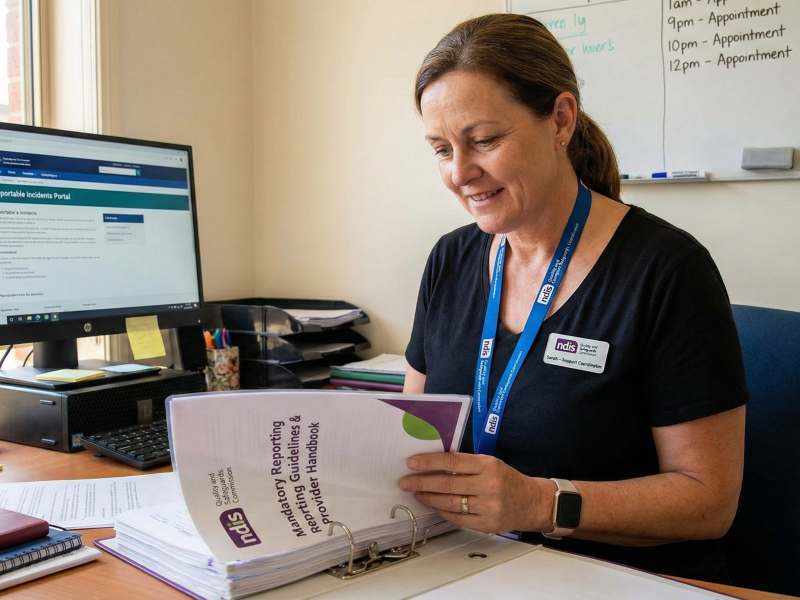Working within the NDIS environment is a vital endeavour for Providers dedicated to the delivery of high-quality, person-centred care. At the heart of ensuring credibility under the NDIS system is the Audit process. This document is a comprehensive checklist, insightful key points, and step-by-step guidance to assist you in preparing and staying compliant.
Understanding the NDIS Audit Process
The NDIS Audit process is a formal review aimed at verifying that Registered Providers are meeting the NDIS Practice Standards. It evaluates whether or not these Providers are delivering services while ensuring safety, respect, and quality outcomes for Participants.
There are two categories of Audits: Verification Audits (for lower-risk Providers) and Certification Audits (for Providers offering more complicated or higher-risk services). Audits are completed by NDIS Quality Approved Auditors on behalf of the NDIS Commission.
The Audit comprises reviewing documents and interviewing Key Personnel, and may include site visits. Providers are required to demonstrate that they are run ethically, have appropriate risk management systems, and meet Participants’ rights and safety expectations.
Being Audit-ready smoothens the process, prevents non-conformity, and facilitates ongoing Registration with the NDIS Commission.
Want to Attract More NDIS Clients?
Get expert advice on how to market your services, connect with clients, and grow your practice.
Significance of NDIS Practice Standards Compliance
Observance of the NDIS Practice Standards is not merely a regulatory obligation, it’s a guarantee of high-quality, Participant-centred supports and services services. The standards ensure responsibility by Providers and that the rights, dignity, and well-being of NDIS Participants are protected.
The Practice Standards address key areas including governance, Participant rights, risk management, incident reporting, and service delivery.
Conformity proves that your organisation:
- Exceeds professionally and ethically
- Values Participant safety and satisfaction
- Employs systematic systems for ongoing improvement
Non-compliance can lead to sanctions, loss of Registration, reputational harm, and lack of trust among Participants. However, timely compliance establishes credibility, ease of access to funding, and a culture of excellence within your organisation.
Being current with changing standards and incorporating them into daily practices is essential to ensuring long-term success within the NDIS field.
Steps to prepare for an NDIS Audit
Preparing for an NDIS Audit involves careful planning, thorough documentation, and internal self assessments. The steps below will help you feel confident and audit-ready:
1. Know the Type of Audit
Identify whether you require a Verification or Certification Audit, based on the registration groups you are applying for. Also check if it is a midterm or renewal audit. Verification audits are a desktop review of documents with a short interview; Certification includes longer document reviews, interviews and site visits.
2. Select an Approved Auditor
Choose an auditor approved by the NDIS Commission. Review their credentials, request quotes, and book early to allow time for preparation.
3. Read the NDIS Practice Standards
Understand the applicable Practice Standards and Quality Indicators. Identify which modules apply to your services and assess your policies, procedures, and practices against them.
4. Gather Required Documents
Ensure all documents are current, complete, and clearly demonstrate compliance. Typical documents include:
- Organisational policies and procedures
- Risk assessments and management plans
- Incident and complaint registers
- Staff qualifications and training records
- Participant feedback and service agreements
5. Conduct an Internal Review
Perform an internal audit to spot gaps. Consider engaging a consultant to help identify risks and fix non-conformities before your official audit.
6. Train Your Team
Ensure staff understand the NDIS Practice Standards and the audit process. In certification audits, auditors may interview team members to verify policy implementation.
7. Implement and Record Quality Improvements
Document any improvements you’ve made—especially those arising from incidents, complaints, or feedback. Auditors want to see active and ongoing quality improvement.
Thorough preparation reduces the risk of non-compliance and boosts your confidence heading into the audit.
Using NDIS Audit Checklists
A checklist for an NDIS Audit is an essential tool that enables Providers to monitor their preparedness for an Audit. It compiles the standards into workable items, walking you through every compliance requirement. If you engage a consultant, they will give you a list of requirements for audit that you can check off.
An organised checklist would incorporate:
- Governance and operating systems
- Incident and complaint management procedures
- Participant rights and participation protocols
- Risk assessment and management tools
- Record-keeping and reporting framework
- Worker training and qualification records
Utilising a checklist ensures that you do not overlook any essential aspects. It facilitates self-Auditing and allows you to visualise compliance progress by department. Further, checklists offer an organised means of delegating responsibility and timelines for filling compliance gaps.
Electronic checklists aids or templates issued by Audit organisations can make the process even more streamlined. Periodic utilisation of such checklists ensures a compliance-oriented proactive role and makes future Audit preparations easier.
Common Challenges During NDIS Audits and How to Overcome Them
For many Providers, especially those new to the process, NDIS audits can feel overwhelming. Here are some of the most common challenges—and practical strategies to overcome them:
- Incomplete or Outdated Documentation: Missing or poorly written policies are a frequent issue.
Solution: Regularly review and update all documents. Use a document control system to track versions and revisions. - Inadequate Worker Awareness: Workers may not understand their responsibilities or be prepared for auditor questions.
Solution: Conduct ongoing staff training and run mock audits so Workers are confident and audit-ready. - Poor Record-Keeping: Gaps in Participant records, risk registers, or complaints logs can result in non-compliance.
Solution: Maintain consistent, transparent records using reliable software or well-organised manual systems. - Lack of Evidence Showing Implementation: Simply having a policy is not enough—you must prove it’s being used in practice.
Solution: Keep implementation evidence such as training attendance, meeting minutes, and practical examples or case studies. - Unclear Roles and Responsibilities: Confusion over who manages audit tasks can leave critical areas overlooked.
Solution: Assign clear roles for audit preparation and compliance responsibilities across your team.
By addressing these challenges proactively, Providers reduce stress across their team, save time, and greatly improve their audit outcomes. Strong preparation, clear communication, and structured systems are the foundation of a smooth audit process.
Referrals Start With Reputation – We’ll Help You Build Both
From networking tips to service refinement, we guide NDIS providers toward lasting impact.
Ongoing Compliance After the Audit
Passing the NDIS Audit is just the beginning. To maintain registration and continue delivering safe, high-quality services, Providers should focus on the following key compliance practices:
- Regular Internal Reviews: Schedule periodic internal audits to assess ongoing compliance with the NDIS Practice Standards.
- Continuous Staff Training: Provide regular training and updates to ensure staff understand current policies, procedures, and best practices.
- Update Documentation: Review and update organisational policies, procedures, and forms to reflect changes in legislation, service delivery, or risk.
- Participant Feedback Mechanisms: Actively encourage and collect Participant feedback, using it to drive meaningful service improvements.
- Incident and Complaint Management: Maintain a clear, consistent process for reporting, recording, and responding to incidents and complaints, with a focus on learning and prevention.
By embedding these practices into daily operations, Providers create a culture of continuous improvement—where compliance becomes part of everyday business, not just a one-off event for audit time.
FAQs
1. What is an NDIS Audit, and why is it required?
An NDIS Audit is an assessment of a Provider’s compliance with the NDIS Practice Standards. Auditing is a mandatory part of the Registration process to ensure Participants receive safe, high-quality, and ethical services.
2. How long does the NDIS Audit process take?
It depends on the type of Audit.
- A NDIS Verification Audits (for lower-risk supports) ranges between 6-12 hours, and is made up of a remote document review and short video/phone interview. Initial Registration is generally approved within 4-6 weeks of Auditing.
- Certification Audits (for higher-risk services) can range from 12-36 hours, and may include site visits. Initial Registration can take anywhere from 3 months to a year, depending on the complexity of the Provider’s Application.
3. What documents do I need for an NDIS Audit?
You’ll need a range of key documents, including:
- Organisational policies
- Incident and complaint registers
- Risk management plans
- Worker training records
- Service agreements
- Feedback Forms
Make sure documents are current, signed where required, and easy to access during your Audit.
4. How much does an NDIS Audit cost?
Audit Fees vary depending on your Registration group and organisation size.
- Verification Audits typically range from $1,500 to $3,000.
- Certification Audits generally range from $5,000 to $15,000, depending on the Provider services.
It’s wise to get quotes from several NDIS-approved Auditing bodies.
5. What are the common reasons Providers fail an NDIS Audit?
Common reasons Providers may fail an NDIS audit include:
- Missing or outdated policies and supporting documentation
- Lack of evidence that Workers are appropriately trained and following approved procedures
- Gaps in incident or risk management systems
- Poor handling of complaints and feedback
- Inability to demonstrate continuous improvement
Staying Audit-ready with well-documented processes and active compliance measures is key to avoiding these pitfalls.
6. How do I stay compliant after passing an Audit?
Ongoing compliance requires:
- Regular internal reviews and spot Audits
- Updating policies and supporting documents as legislation and/or services change
- Worker training sessions, including annual refresher trainings
- Logging and analysing incidents, feedback, and complaints
- Using Participant feedback to shape service delivery
Embedding compliance into everyday operations is the best way to prepare for renewal Audits and maintain high-quality supports.


